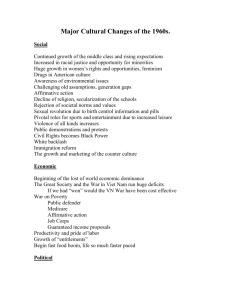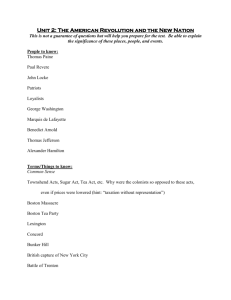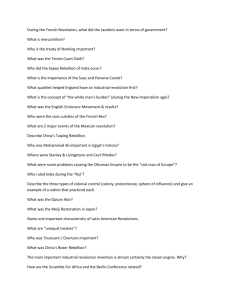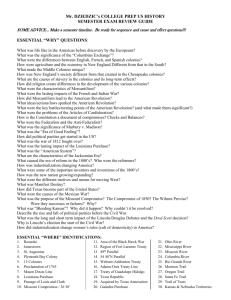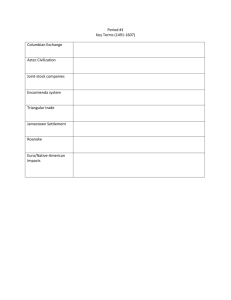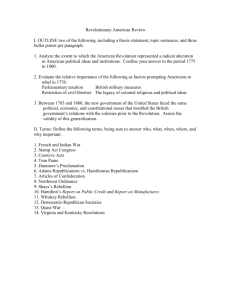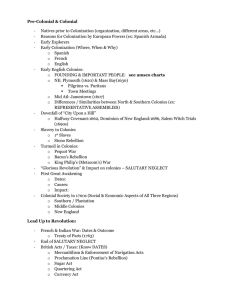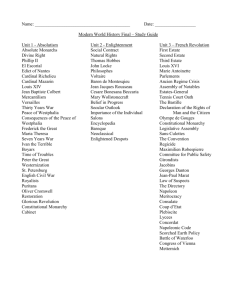Jefferson – Jackson test review sheet
advertisement
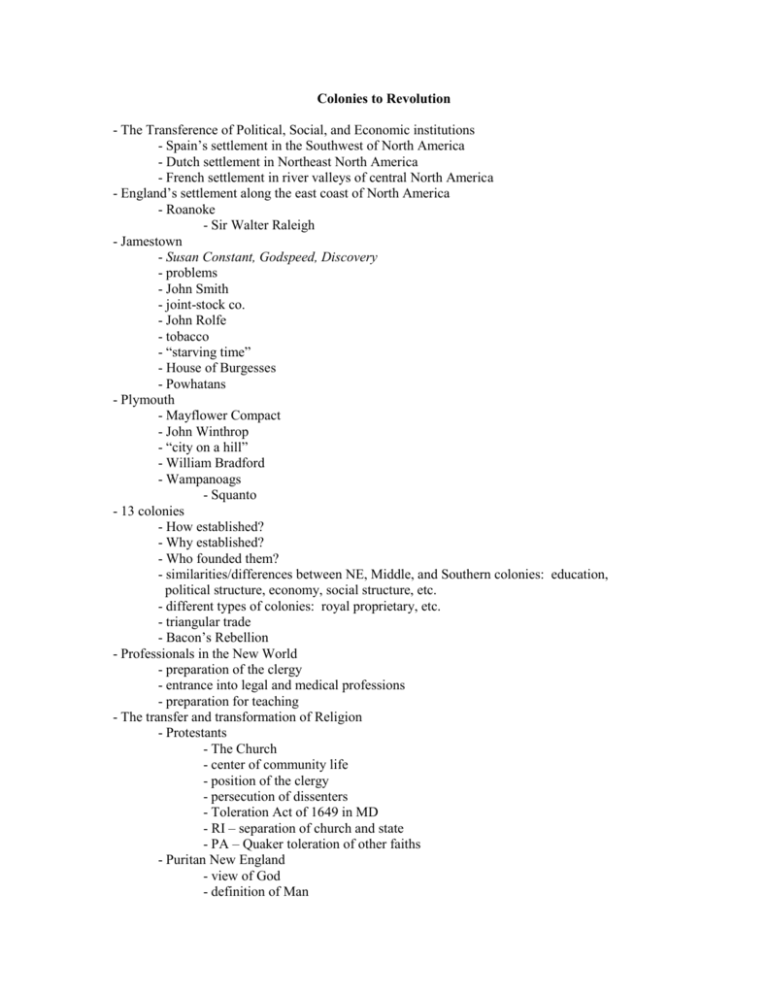
Colonies to Revolution - The Transference of Political, Social, and Economic institutions - Spain’s settlement in the Southwest of North America - Dutch settlement in Northeast North America - French settlement in river valleys of central North America - England’s settlement along the east coast of North America - Roanoke - Sir Walter Raleigh - Jamestown - Susan Constant, Godspeed, Discovery - problems - John Smith - joint-stock co. - John Rolfe - tobacco - “starving time” - House of Burgesses - Powhatans - Plymouth - Mayflower Compact - John Winthrop - “city on a hill” - William Bradford - Wampanoags - Squanto - 13 colonies - How established? - Why established? - Who founded them? - similarities/differences between NE, Middle, and Southern colonies: education, political structure, economy, social structure, etc. - different types of colonies: royal proprietary, etc. - triangular trade - Bacon’s Rebellion - Professionals in the New World - preparation of the clergy - entrance into legal and medical professions - preparation for teaching - The transfer and transformation of Religion - Protestants - The Church - center of community life - position of the clergy - persecution of dissenters - Toleration Act of 1649 in MD - RI – separation of church and state - PA – Quaker toleration of other faiths - Puritan New England - view of God - definition of Man - Church’s role in the community - dissenters within the faith - Salem Witch Hunts - Samuel Sewall - work ethic - emphasis on education - Protestantism: Middle Colonies - influence of the Quakers - inner light - abolition of slavery - equality of sexes - pacifism - Anglican Church - Anglican Church in the South - Parson’s Cause - Methodists and Baptists - Daily life and recreation in the English Colonies - Diet - Clothing - Recreation - Courtship and marriage - health and epidemics - first inoculation: smallpox - art - music - architecture - theater - the printed word - scarcity of books - libraries - social classes in America vs. England - social mobility - What was it based on? - Who was at top, middle, bottom? - Great Awakening - Jonathan Edwards - George Whitefield - Enlightenment - Ben Franklin - Peter Zenger - Cotton Mather - Bacon’s Rebellion - St. Augustine - patrons - King Philip’s War - French and Indian War - causes - Iroquois League - colonial assemblies - Albany Plan of Union - Battle of Quebec - William Pitt - effects - Pontiac’s Rebellion - Proclamation of 1763 - Paxton Boys - Regulator movement - Road to Revolution - mercantilism - Navigation Acts - “virtual representation” - “salutary neglect” - Colonial Assemblies vs. the Governors - Quebec Act - Declaratory Act - Stamp Act - Stamp Act Congress - Sons of Liberty - Samuel Adams - Daughters of Liberty - Townshend Duties - writs of assistance - Tea Act - British East India Co. - Boston Tea Party and effects - Coercive Acts - the Gaspee Affair - Galloway Plan of Union - Committees of Correspondence - Thomas Paine and Common Sense - decisions of 1st and 2nd Continental Congress - Peyton Randolph - Olive Branch Petition - George Washington - Revolution - American vs. British advantages and disadvantages - Battle of Bunker Hill – why did both consider it a victory? - Battle of Saratoga – why was it a turning point? - John Burgoyne - Battle of Yorktown – how were British defeated? - Marquis de Lafayette - General George Washington - Lord Cornwallis - Hessians - terms of Treaty of Paris Federalist Era – Jacksonian era - Articles of Confederation - powers of government under Articles - weaknesses of Articles - Land Ordinance of 1785 - NW Ordinance of 1787 - achievements of the Articles? - Shays Rebellion - Constitutional Convention - Founding Fathers - backgrounds - major beliefs as to how Constitution should be created - feelings about political parties - beliefs of Federalists vs. Anti-Federalists - What parts of the country supported Constitution/didn’t support Constitution? - Bill of Rights - Why created? - major provisions of the Constitution - articles, amendments, etc. - republican motherhood - cult of domesticity - Jane Addams - Margaret Fuller - Washington’s administration - Whiskey Rebellion - cabinet members - Hamilton’s financial program - Jefferson vs. Hamilton debate over tariff and French Revolution: - What were their viewpoints on these issues? Why? - Who did GW support? - Neutrality Proclamation - Washington’s Farewell Address - Political parties - Democ.-Repubs. vs. Federalists - major beliefs - who supported each party - leadership - Adams’ administration - problems with France: - XYZ Affair - 1796 election - interfering with US trade - unhappy with Jay Treaty - Alien and Sedition Acts - KY and VA Resolutions - Madison and Jefferson - states’ rights theory - election of 1800 – why has it been referred to as “another revolution”? - Jefferson’s administration - Albert Gallatin - economic changes made - Marbury v. Madison (1803) - What was case about? - significance? - John Marshall - Louisiana Purchase - How/why did US acquire this territory? - problems Jefferson had with acquiring it? - Lewis and Clark - Madison’s administration - War of 1812 - causes - Hartford Convention - war hawks - Battle of New Orleans - Was war worth it? - Henry Clay and the American System - Monroe Doctrine - Why created? - What did it say? - Missouri Compromise - Why created? - What did it say? - Industrial Revolution - Erie Canal - where? - when built? - the “Lowell system” - Eli Whitney - Samuel Slater - Robert Fulton - James Hargreaves - cult of domesticity - election of 1824 - “corrupt bargain” – why? - Jackson’s administration - spoils system - kitchen cabinet - Cherokee vs. GA - John Marshall - war with 2nd Bank of US - Nicholas Biddle - Roger Taney - pet banks and effects - Specie Circular - “Tariff of Abominations” - John C. Calhoun - Nullification crisis - Daniel Webster Jacksonian era – Civil War - Alexis de Tocqueville and Democracy in America - main points about America - Characteristics of America in early nineteenth century - much mobility – why? - role of women in society - how people made money - Reform movements - Major educational reforms - Religion - changes in 2nd Great Awakening - success of Shakers, Mormons, Rappites? - Abolition - successful? - William Lloyd Garrison - goals and problems - Women’s movement - successful? - Seneca Falls Convention and “Declaration of Sentiments and Resolutions” - Stanton and Anthony - Garrison - Prison reform - successful? - Dorothea Dix - Temperance - successful? - major state laws passed - Transcendentalists - beliefs? - major focus of writing of Emerson, Poe, Edwards, Fitzhugh, Irving, Hawthorne. - Texas/Mexico/US - policy of Mexico towards American immigration to TX early - Mexican restrictions on residents and further immigration to TX later - Sam Houston - Santa Anna - Battle of the Alamo and significance - US problems with annexing TX - Manifest Destiny - John O’Sullivan - President Polk and main goals - slavery in America before Civil War - increase/decrease? Why? - slave conditions - who owned slaves? - American (Know-Nothing) Party - main beliefs - Gold Rush - Major differences between North and South - impact of RR’s - Road to Civil War - main causes of Civil War - Wilmot Proviso - Calhoun’s Resolution - Lewis Cass and popular sovereignty - Compromise of 1850 - Ostend Manifesto - major presidents and mistakes made - Kansas-Nebraska Act - Bleeding Kansas - John Brown - Lecompton Constitution - Dred Scott v. Sanford - Lincoln/Douglas debates - Stephen Douglas - election of 1860 - Crittenden Compromise - Why doesn’t Lincoln support it? - Civil War - advantages/disadvantages of North and South - Fort Sumter - effects of Antietam and Gettysburg - Emancipation Proclamation - why created - what did it do - effects - King Cotton diplomacy - successful? - diplomacy of Civil War - Who did Europe support, if anyone? Why? Reconstruction to Industrial Revolution - Oneida community and Brook Farm – how were they similar? - Reconstruction - problems between Johnson and Radical Republicans - major programs of both - Reconstruction Acts of 1867 - Why was Johnson impeached? - What happened to most southern Blacks during Reconstruction? - Black Codes - Compromise of 1877 - shift to sharecropping and crop lien system in South – how did it effect South? - Native Americans - Who was the biggest group to move into Appalachia as NA’s were defeated? - effects on transcontinental RR on them - causes of 2nd Sioux War - Battle of Little Big Horn - Battle of Wounded Knee - Dawes Act - US government’s NA policy – Dept. of Interior and War Dept. - Helen Hunt Jackson’s A Century of Dishonor - Farmers - US policy towards agriculture - Causes of agrarian discontent - In what areas did farmers seek federal relief? - Populist Party - goals - leadership - Why failed? - William Jennings Bryan - Why failed in 1896 election? - Why did farmers’ movement lose momentum at end of 1890s? - Grange - goals - leadership - Why failed? - Mary Elizabeth Lease - Industry - Causes of Industrial Revolution - Why did many co.’s adopt horizontal and vertical integration? - tactics of Rockefeller and Carnegie - purpose of anticombination laws passed in states in 1890s - laissez-faire - How much did government regulate industry? Why? - Sherman Anti-Trust Act: what did it do and was it effective? - Interstate Commerce Act: what did it do and was it effective? - Immigration - What country did most old immigrants come from? - old vs. new immigration - When did they come? - From what part of Europe? - Where did most settle and why? - When did US adopt strict immigration laws? Were they effective? - Why did most Slavic immigrants settle in Midwest? - Why was their most animosity towards new immigrants? - Gilded Age - Why was there so much corruption? - Boss Tweed and Thomas Nast - What happened to US economy during Gilded Age? - Did hours increase? Wages? Etc. - Problems of cities - Describe major elements of a late nineteenth and early twentieth century city. - Major problems of cities. - Why did death rate decline in cities in late nineteenth century? - settlement houses - Who ran them? - What kind of services did they provide? - Labor movement - In what ways was it successful and not successful? - AFL vs. K of L - membership - goals - rate of success - Haymarket Square Riot - Pullman Strike - Compare/contrast W.E.B. Du Bois and Booker T. Washington Imperialism – Depression - Imperialism - isolationism vs. imperialism - causes of imperialism - Alfred Thayer Mahan - causes of Spanish-American War - Joseph Pulitzer and Randolph Hearst - US gains as a result of Spanish-American War - Filipino-American War - Emilio Aguinaldo - US debate over annexation - Open Door Notes - Boxer Rebellion - Russo-Japanese War - TR’s goal in mediating Treaty of Portmouth - Roosevelt Corollary and why it was created - Progressives - who were they? - problems - goals - muckrakers - Upton Sinclair and The Jungle - effects - Robert LaFollette - direct primary, etc. - 17th and 18th Amendments - Alice Paul - 19th Amendment - TR vs. Taft - main reasons they split - Wilson’s progressivism - Federal Trade Commission, etc. - World War I - Committee on Public Information - George Creel - goals of propaganda - main reasons US joined war - main goals of Wilson’s 14 Points - Wilson vs. Senate - Why did US fail to join League of Nations? - Post-war foreign policy - goals of Washington Naval Conference - Kellogg-Briand Pact - Harding - Why was he generally an ineffective president? - Teapot Dome Scandal - Harding and Coolidge’s feelings about big business - D.W. Griffith’s The Birth of a Nation - Why was it controversial? - 1920s - Margaret Sanger - goal of the Palmer Raids - problems of farmers - Ku Klux Klan - Harlem Renaissance - Secretary of Treasury Andrew Mellon’s policies - Scopes monkey trial - Sacco-Vanzetti trial - Charles Lindbergh - Henry Ford and Model T - writers - What was literature of writers such as Lewis and Fitzgerald mainly about? - Why were they called the “lost generation”? - Great Depression - causes - Hoover vs. FDR in dealing with Depression - What were “Hoovervilles”? - goal of Bonus Expeditionary Force - major goals of New Deal - accomplishment of FDR’s “Hundred Days” - National Industrial Recovery Act - Schetcher v. US - Tennessee Valley Authority - Wagner Act - Agricultural Adjustment Act - Butler v. US - Social Security Act - major opponents: Townsend, Long, Coughlin - FDR’s court-packing plan - successful? - Why did AFL split apart during Depression? WWII – Clinton era - “Good Neighbor” policy with Latin America - Hitler and Mussolini - fascism - Munich Conference - 1938 - appeasement - Invasion of Poland and rest of Czechoslovakia - beginning of WWII (1939) - blitzkrieg - US Neutrality? - FDR - Neutrality Acts - cash and carry (Congressional approval??) - bases for destroyers (Congressional approval??) - lend-lease (Congressional approval??) - Selective Service Act (1st peacetime draft in US history) - Pearl Harbor (Hawaii) - Why was US unprepared? - Allies - - - - - Winston Churchill - Josef Stalin US first focuses on defeating Germany rather than Japan. Why? - success in Africa and Italy - Operation Torch - Operation Overlord/D-day (turning point) - Germany surrenders on May 7, 1945. Holocaust - War Refugee Board War in the Pacific - island hopping - General Douglas MacArthur - Battle of Midway (turning point) - Atomic bomb dropped on Hiroshima and Nagasaki - why? War on the home front - Japanese concentration camps in US. Why? - Korematsu vs. US - Women and African Americans get lots of jobs because men away at war. Wartime diplomacy: what was said at each? - Yalta Conference - Potsdam Conference - Creation of the United Nations Cold War - Define it - Truman - containment - George Kennan and the “Long Telegram” - Cordell Hull - Truman Doctrine - Marshall Plan - NATO - Berlin Airlift - Teller Amendment - Korean War - Why does he fire MacArthur? - Eisenhower - Sec. of State Dulles - massive retaliation - end of Korean War - Interstate Highway System - Sputnik and effects on US - NASA - use of CIA - increased alliances (OAS, SEATO, CENTO) - U-2 incident - Kennedy - Bay of Pigs invasion and results - Operation Mongoose - Vienna Summit - Berlin Wall - Cuban Missile Crisis and results - LBJ - Six-day War - Vietnam: Eisenhower, JFK, LBJ, RN, and Ford - US involvement with French - Geneva Accords - Ho Chi Minh - Ngo Dinh Diem and problems - Tonkin Gulf incident - Gulf of Tonkin Resolution - search and destroy - General William Westmoreland - Tet Offensive - “Pentagon Papers” - Daniel Ellsberg - Vietnamization and increased bombing - 1975 – Saigon falls to Vietcong - Nixon - détente - Strategic Arms Limitation Treaty (SALT) - Yom Kippur War (Egypt and Syria vs. Israel) - shuttle diplomacy - visit to China - Ronald Reagan - renewed Cold War tensions - “evil empire” - Strategic Defense Initiative (“Star Wars”) - End of Cold War - 1989 – Berlin Wall falls - 1991 – SU falls Civil Rights - Brown v. Board of Education of Topeka, Kansas (1954) - Roy Wilkins and NAACP - Rosa Parks - Montgomery bus boycott - Martin Luther King, Jr. and the Southern Christian Leadership Conference (SCLC) - Civil Rights Act of 1957 - Students Non-Coordinating Committee (SNCC) - Freedom Riders - 1963 March on Washington - Birmingham – 1963 - Civil Rights Act of 1964 - Voting Rights Act of 1965 - Malcolm X and Black Muslims - Black Panthers - Huey Newton, Bobby Seale, Eldridge Cleaver - Black Power movement - Stokely Carmichael - MLK assassination - Green v. County School Board (1968) - Decision said gov. would cut off funds to racially segregating school systems. - Nixon ignored SC and instructed Justice Dept. to support school boards that were to delay segregation. - SC, though, affirmed integration by busing students from outside the area to try to achieve racial balance in school. - Cesar Chavez and NFW - American Indian Movement - women’s movement - NOW - Betty Friedan - STOP ERA movement - Phyllis Schafly - Geraldine Ferraro Eisenhower-Clinton domestic (and some foreign) policy - McCarthyism - 2nd Red Scare - conformity - David Riesman - John F. Kennedy - New Frontier programs - difficulties with Congress - assassination: Lee Harvey Oswald and Jack Ruby - Rachel Carson - Lyndon Baines Johnson - major programs of the Great Society - failed due to money spent on Vietnam War - Michael Harrington and The Other America: What did this reveal? - Warren Court - Chief Justice Earl Warren - liberal decisions (Brown v. Board of Ed, etc) - Barry Goldwater - lost to LBJ in 1964 - very conservative - support of using nuclear weaponry scared some people - Richard Nixon - Chief Justice Warren Burger - chosen by Nixon b/c he was conservative - main purpose of New Federalism - Spiro Agnew - resigned from office over corruption - Watergate: What happened at the hotel? - Archibald Cox - Saturday Night Massacre - Nixon resigns - War Powers Act: What did it say and why was it created? - Gerald Ford - pardons Nixon - Helsinki Accords - Jimmy Carter - What did Carter do during energy crisis? - Soviet invasion of Afghanistan: What did the US do? - Camp David Accords - Iranian hostage crisis - US helicopter crashed attempting rescue - Ayatollah Ruholla Khomeini - Ronald Reagan - Mikhail Gorbachev and Reagan summit meeting - Strategic Defense Initiative - increased Cold War tensions - Iran-Contra Scandal - US caught selling arms to Iranians to get release of hostages. Money from sale would go to Nicaraguan guerrillas who were fighting to take down the Sandanista government. - little effect on Reagan - “Teflon President” - Challenger explosion - George Bush, Sr. - Persian Gulf War - Iraq invades Kuwait - Norman Schwartzkopf - Operation Desert Shield and Storm - Saddam Hussein - Iraq pulled out of Kuwait but Hussein remained in power. - Bill Clinton - candidates in the 1992 election: H. Ross Perot, Clinton, Bush, Sr. - government shutdown - Newt Gingrich - US troops in Somalia to protect food shipments from getting in hands of war lords. - failure - Crisis in the Balkans - Slobodan Milosevic - Kosovo and ethnic cleansing - impeachment and acquittal
